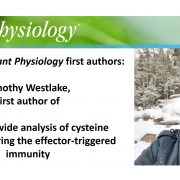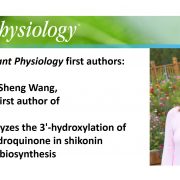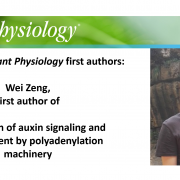
Recognizing Plant Physiology first authors: Philip Berg
Plant Physiology, Plant Physiology: Author ProfilesPhilip Berg, first author of Proteome-wide analysis of cysteine reactivity during the effector-triggered immunity
Current position: Ph.D. student; Biochemistry, Bioinformatics, and Systems Biology, Mississippi State University
Education: MSc in Genomics and Systems biology, BSc in Plant Biology
Non-scientific…

Recognizing Plant Physiology first authors: Timothy Westlake
Plant Physiology, Plant Physiology: Author ProfilesTimothy Westlake, first author of Proteome-wide analysis of cysteine reactivity during effector-triggered immunity
Current Position: Researcher at the National Institutes of Health and current student pursuing Masters in Public Health at Johns Hopkins University in Maryland.
Future Position: Post-doctoral…

Recognizing Plant Physiology first authors: Lisa-Marie Schmid
Plant Physiology, Plant Physiology: Author ProfilesLisa-Marie Schmid, first author of PUMPKIN, the sole Plastid UMP Kinase, Associates with Group II Introns and Alters Their Metabolism
Current Position: PhD student in the group of PD Dr. Jörg Meurer, Leister lab, Ludwig-Maximilians-University, München, Germany
Education: B.Sc. Biology and M.Sc.…

Setting and Diffusing the Cyanide Bomb in Plant Defense
Blog, Plant Physiology, Plant Physiology: News and ViewsHydrogen cyanide (HCN) is a potent inhibitor of cytochrome c oxidase, a conserved component of the respiratory electron transport chain in all aerobic life. Thus, HCN is well suited to serve as a broad-spectrum chemical defense, and indeed it plays such a role in many interactions between plants and…

Autophagy and Chloroplast Quality Control: Fatty Acid Synthesis Counts
Plant Physiology, Plant Physiology: News and ViewsPlants devote more than 70% of their available nitrogen to maintaining chloroplast function (Makino and Osmond, 1991). During senescence or under stress conditions, chloroplasts are degraded and their constituent components are recycled. Chloroplasts can be degraded through at least three pathways: (1)…

Scientists reveal the mechanism of mRNA polyadenylation in auxin and plant development
Blog, Plant Physiology
(Translated from the Chinese original)
Auxin is an important plant hormone that is essential for plant growth and development. At present, people's understanding of auxin signal transduction mainly focuses on the process of auxin receptor TIR1/AFBs- mediated Aux/IAAs protein degradation…

Recognizing Plant Physiology first authors: Sheng Wang
Plant Physiology, Plant Physiology: Author ProfilesSheng Wang, first author of CYP76B74 catalyzes the 3'-hydroxylation of geranylhydroquinone in shikonin biosynthesis
Current Position: Assistant Researcher at National Resources Center of Chinese Materia Medica, China Academy of Chinese Medical Sciences, Beijing, China
Education: B.S. in Resources…

Recognizing Plant Physiology first authors: Wojciech J. Nawrocki
Plant Physiology, Plant Physiology: Author ProfilesWojciech J. Nawrocki, first author of Chlororespiration controls growth under intermittent light
Current Position: Postdoctoral fellow at the VU Amsterdam
Education: MSc in Biophysics, Sorbonne Université, Paris, France, PhD, Institut de Biologie Physico-Chimique, CNRS, Paris, France
Non-scientific…

Recognizing Plant Physiology first authors: Wei Zeng
Plant Physiology, Plant Physiology: Author ProfilesWei Zeng, first author of Modulation of auxin signaling and development by polyadenylation machinery
Current Position: Ph.D. candidate, Key Laboratory of Plant Molecular Physiology, Institute of Botany, Chinese Academy of Sciences, Beijing 100093, China
Education: M.S. in College of Life Sciences,…

